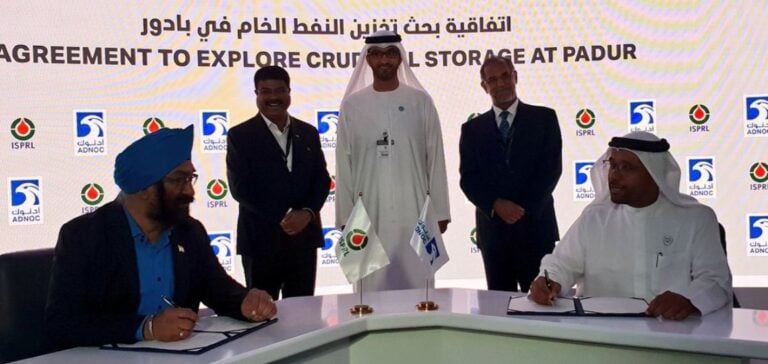The United Arab Emirates (UAE) is looking to increase its crude oil storage volumes in India at Indian Strategic Petroleum Reserves Ltd (ISPRL) facilities.
ADNOC, which currently holds around 5.86 million barrels at Mangalore, is discussing new storage options in partnership with India.
The agreement signed during the visit to India by Sheikh Khaled bin Mohamed bin Zayed Al Nahyan, Crown Prince of Abu Dhabi, establishes a basis for extending this cooperation.
Discussions also include the renewal of the existing management agreement, with conditions to be negotiated between the parties.
The recent authorization granted to ADNOC to re-export oil from Indian storage caverns positions India on a par with other Asian countries such as Japan and South Korea, where international oil producers have similar rights.
However, to date, ADNOC has not made use of this option.
India’ s strategy of tripling its strategic storage capacity over the next ten years underlines its objective of strengthening its energy security, in response to geopolitical uncertainties and price fluctuations.
Expansion Plan and Public-Private Partnerships
India’s plan to strengthen its strategic reserves includes a significant expansion of its storage facilities.
The first phase comprises three sites with a total capacity of 5.33 million tonnes: Visakhapatnam, Mangalore, and Padur.
The second phase, currently in preparation, will add 6.5 million tonnes at Chandikhol and Padur under a public-private partnership model.
This model, known as DBFOT (Design, Build, Finance, Operate, Transfer), is part of an approach designed to mobilize both public and private resources.
The Indian government’s approach aims not only to diversify sources of energy supply, but also to attract foreign investment in critical infrastructure.
This policy is aligned with the long-term objectives of securing supplies in an uncertain global environment.
Production Concession Agreement with Urja Bharat
At the same time, India and the UAE signed a production concession agreement for Abu Dhabi’s onshore Block 1.
This agreement, between Urja Bharat, a joint venture of Indian Oil Corporation and Bharat PetroResources Ltd, and ADNOC, marks a major step for an Indian company in the UAE hydrocarbon sector.
This concession enables India to import crude oil directly from UAE fields, thereby strengthening its energy security.
Both parties express their willingness to diversify their partnership, with prospects for collaboration in sectors such as critical minerals and advanced technologies.
This reflects a strategy to explore new dimensions of cooperation beyond traditional oil and gas agreements.
Perspectives on Future Developments
Expanding crude oil reserves and new production agreements demonstrate a shared desire to consolidate a strategic energy partnership.
India is pursuing a policy of energy diversification that extends beyond its traditional borders, aiming to secure its energy needs through targeted international partnerships.
Current agreements with global players such as ADNOC reflect this dynamic.
With the growing importance of energy security in a tense geopolitical context, these initiatives could set new standards for energy cooperation between oil-producing and oil-consuming countries.





















